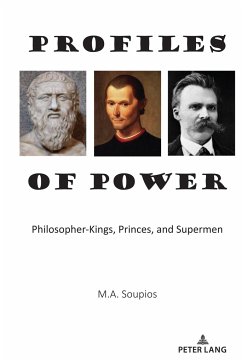
Postcategorical Utopia
James Baldwin and the Political Unconscious of Imagined Futures
Herausgegeben: Baccolini, Raffaella; Balasopoulos, Antonis; Fischer, Joachim; Kelly, Michael G.; Moylan, Tom; Wegner, Phillip E.
Versandkostenfrei!
Versandfertig in 6-10 Tagen
52,95 €
inkl. MwSt.
Weitere Ausgaben:

PAYBACK Punkte
0 °P sammeln!
«Kilpeläinen's engaging journey through Baldwin's postcategorical utopian thought shows how this writer's under-appreciated later works foresee today's heated ideological and philosophical debates. From political unconscious to Afrofuturism, this book maps Baldwin's Black queer wisdom: Labels and essentialized identities easily 'become instruments of power,' dividing and alienating societies, cultures, and individuals.»(Magdalena J. Zaborowska, Professor of American Studies and Afroamerican and African Studies, University of Michigan)«This study is an important and timely analysis of Baldw...
«Kilpeläinen's engaging journey through Baldwin's postcategorical utopian thought shows how this writer's under-appreciated later works foresee today's heated ideological and philosophical debates. From political unconscious to Afrofuturism, this book maps Baldwin's Black queer wisdom: Labels and essentialized identities easily 'become instruments of power,' dividing and alienating societies, cultures, and individuals.»
(Magdalena J. Zaborowska, Professor of American Studies and Afroamerican and African Studies, University of Michigan)
«This study is an important and timely analysis of Baldwin's later novels. Kilpeläinen's writing is sophisticated and eloquent, and his critical framework is startlingly clear and illuminating. Seizing on Baldwin's 'incessant urgency,' he advances an authoritative, convincing argument that will add enduringly to our collective appreciation of America's prophetic witness.»
(D. Quentin Miller, Professor of English, Suffolk University, Boston)
This book examines the dialectic of ideology and utopia in three novels by James Baldwin. Taking Fredric Jameson's seminal theory of the political unconscious as its point of departure, Dr Pekka Kilpeläinen conceptualizes Baldwin's writing in terms of the impulse of postcategorical utopia, where the ideological categorizations based on race and sexuality, in particular, are challenged by the utopian impulse to imagine alternative futures. The readings of three of Baldwin's novels probe into the questions of ideological and utopian spatialities, transgressive interracial and same-sex relationships, and critiques of both Western modernity and its black counterculture. Baldwin's denouncement of the oppressive effects of identity categories penetrates his entire oeuvre, from his early, critically acclaimed work to his later, often ignored novels. Seen through the lens of postcategorical utopia, the urgency of Baldwin's vision gains a new sense of immediacy and relevance.
(Magdalena J. Zaborowska, Professor of American Studies and Afroamerican and African Studies, University of Michigan)
«This study is an important and timely analysis of Baldwin's later novels. Kilpeläinen's writing is sophisticated and eloquent, and his critical framework is startlingly clear and illuminating. Seizing on Baldwin's 'incessant urgency,' he advances an authoritative, convincing argument that will add enduringly to our collective appreciation of America's prophetic witness.»
(D. Quentin Miller, Professor of English, Suffolk University, Boston)
This book examines the dialectic of ideology and utopia in three novels by James Baldwin. Taking Fredric Jameson's seminal theory of the political unconscious as its point of departure, Dr Pekka Kilpeläinen conceptualizes Baldwin's writing in terms of the impulse of postcategorical utopia, where the ideological categorizations based on race and sexuality, in particular, are challenged by the utopian impulse to imagine alternative futures. The readings of three of Baldwin's novels probe into the questions of ideological and utopian spatialities, transgressive interracial and same-sex relationships, and critiques of both Western modernity and its black counterculture. Baldwin's denouncement of the oppressive effects of identity categories penetrates his entire oeuvre, from his early, critically acclaimed work to his later, often ignored novels. Seen through the lens of postcategorical utopia, the urgency of Baldwin's vision gains a new sense of immediacy and relevance.














